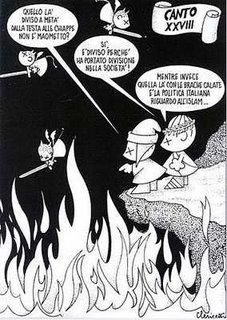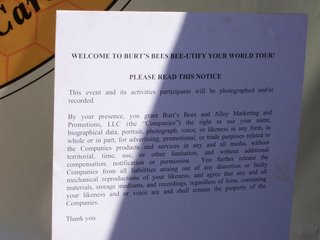Neal Stephenson: Zodiac
1988. That's the first year I read Neal Stephenson. For some long forgotten reason--artwork on the cover, clever blurb on the back; the usual reasons for picking up a fiction novel from someone you've never heard of--I bought Zodiac: An Eco-Thriller. A straight forward thriller involving science, politics, heavy metal (chemical and musical), and conspiracies, I was instantly captivated. I'v always felt Sangamon Taylor was a great character and wouldn't mind if Stephenson would revisit him. It would be interesting to see what he's like twenty years later. I've also felt that Zodiac gives a great template for a TV show; much more so than any other Stephenson novel. You have a semigenius asshole who spends his days shutting down multimillion dollar corporations for toxic waste, rides around Boston Harbor in a zodiac, yet can't afford a car. Toxic Spiderman indeed. It would be like "Spenser For Hire," but not boring.
Is it great? No, it isn't, though it is very good. What it has is a solid story and flashes of genius. Reading it 1988 there was a sense that this author had some real talent and a way with the language. There are places in the story where this talent almost gets in the way and his rhetorical flourishes draw too much attention to themselves. For me, it was the recognition that if he ever got his talent under control, we could expect great things.
I've excerpted part of the opening chapter for a few reasons. One, it gets off to the typical Neal Stephenson quick start. He throws a lot of stuff out there and expects you to hang on while he fills in the blanks. Two, he quickly sets up the main character and his personality. Three, great first sentence. Four, it is just filled with Stephensonisms--the bon mots you either love or hate. Such as:
- bacon was smoldering on the range, filling the house with gas-phase polycyclic aromatics-my favorite carcinogen by a long shot
- Once again, my roommate was using nitrous oxide around an open flame
- I'd already moved us way up into Deep Cable
- Tess emerged from the part of the house where women lived and bathrooms were clean
- Sangamon's Principle," I said. "The simpler the molecule, the better the drug. So the best drug is oxygen. Only two atoms. The second-best, nitrous oxide-a mere three atoms. The third-best, ethanol-nine. Past that, you're talking lots of atoms.
- Toxic Spiderman. Because he's broke and he never gets laid.
- So once I'd fueled myself up on coffee and Bart's baco-cinders-nothing beats an all-black breakfast-and read all the comics, I threw one leg over my battle-scarred all-terrain stump-jumper and rode several miles to work.
- The approaching BMW made an abortive swerve toward the next lane, causing a ripple to spread across Charlesgate as everyone for ten cars back tried to head east. Then he throbbed to a halt (computerized antilock braking system) and slumped over on his horn button. The next lane was easy: some Camaro-driving freshman from Jersey made the mistake of slowing down and I seized his lane. The asshole in the BMW tried to cut behind me but half the bicyclists, and the biddy in the Benz, had the presence of mind to lurch out and block his path.
- GEE International. They employ me as a professional asshole, an innate talent I've enjoyed ever since second grade, when I learned how to give my teacher migraine headaches with a penlight. I could cite other examples, give you a tour down the gallery of the broken and infuriated authority figures who have tried to teach, steer, counsel, reform, or suppress me over the years, but that would sound like boasting. I'm not that proud of being a congenital pain in the ass. But I will take money for it.
- I've lost two girlfriends and a job by reading an ingredients label out loud, with annotations, at the wrong time.
- Actually, the shit coming out of Basco's pipe was a hundred thousand times more concentrated than was legally allowed. The difference between pH 13 and pH 8 was five, which meant that pH 13 was ten to the fifth power-a hundred thousand times-more alkaline than pH 8. That kind of thing goes on all the time. But no matter how many diplomas are tacked to your wall, give people a figure like that and they'll pass you off as a flake. You can't get most people to believe how wildly the eco-laws get broken. But if I say "More than twice the legal limit," they get comfortably outraged.
- Rebecca had picked the sunniest corner of the room and the light was making her green eyes glow like traffic lights and her perfume volatilize off the skin. She and I had been in the sack a few times. The fact that we weren't going to be there in the near future made her a hundred thousand time-oops-more than twice as beautiful.
Uh, maybe I should stop there. If I pulled every line and paragraph that made me smile, I'd quote half the damn book. Here's about one-third of chapter one.
Roscommon came and laid waste to the garden an hour after dawn, about the time I usually get out of bed and he usually passes out on the shoulder of some freeway. My landlord and I have an arrangement. He charges me and my housemates little rent-by Boston standards, none at all-and in return we let him play fast and loose with our ecosystem. Every year at about this time he destroys my garden. He's been known to send workmen into the house without warning, knock out walls in the middle of the night, shut off the water while we shower, fill the basement with unidentified fumes, cut down elms and maples for firewood, and redecorate our rooms. Then he claims he's showing the dump to prospective tenants and we'd better clean it up. Pronto.
This morning I woke to the sound of little green pumpkins exploding under the tires of his station wagon. Then Roscommon stumbled out and tore down our badminton net. After he left, I got up and went out to buy a Globe. Wade Boggs had just twisted his ankle and some PCB-contaminated waste oil was on fire in Southie.
When I got back, bacon was smoldering on the range, filling the house with gas-phase polycyclic aromatics-my favorite carcinogen by a long shot. Bartholomew was standing in front of the stove. With the level, cross-eyed stare of the involuntarily awake, he was watching a heavy-metal video on the TV. He was clenching an inflated Hefty bag that took up half the kitchen. Once again, my roommate was using nitrous oxide around an open flame; no wonder he didn't have any eyebrows. When I came in, he raised the bag invitingly. Normally I never do nitrous before breakfast, but I couldn't refuse Bart a thing in the world, so I took the bag and inhaled as deep as I could. My mouth tasted sweet and five seconds later about half of an orgasm backfired in the middle of my brain.
On the screen, poodle-headed rockers were strapping a cheerleader to a sheet of particle board decorated with a pentagram. Far away, Bartholomew was saying: "Poyzen Boyzen, man. Very hot."
It was too early for social criticism. I grabbed the channel selector.
"No Stooges on at this hour," Bart warned, "I checked." But I'd already moved us way up into Deep Cable, where a pair of chaw-munching geezers were floating on a nontoxic river in Dixie, demonstrating how to push-start a comatose fish.
Tess emerged from the part of the house where women lived and bathrooms were clean. She frowned against the light, scowling at our bubbling animal flesh, our cubic yard of nitrous. She rummaged in the fridge for some homemade yogurt.
"Don't you guys ever lay off that stuff?"
"Meat or gas?"
"You tell me. Which one's more toxic?"
"Sangamon's Principle," I said. "The simpler the molecule, the better the drug. So the best drug is oxygen. Only two atoms. The second-best, nitrous oxide-a mere three atoms. The third-best, ethanol-nine. Past that, you're talking lots of atoms." '
"So?"
"Atoms are like people. Get lots of them together, never know what they'll do. It is my understanding, Tess, that you've been referring to me, about town, as a 'Granola James Bond'."
Tess didn't give a fuck. "Who told you about that?"
"You come up with a cute phrase, it gets around."
"I thought you'd enjoy it."
"Even a horse's ass like me can detect sarcasm."
"So what would you rather be called?"
"Toxic Spiderman. Because he's broke and he never gets laid."
Tess squinted at me, implying that there was a reason for both problems. Bart broke the. silence. "Shit, man, Spider-man's got his health. James Bond probably has AIDS."
I went outside and followed Roscommon's tire tracks through the backyard. All the pumpkins were destroyed, but I didn't care about these decoys. What could you do with a pumpkin? Get orange shit all over the house? The important stuff-corn and tomatoes-were planted up against fences or behind piles of rubble, where his station wagon couldn't reach.
We'd never asked Roscommon if we could plant a garden out here in the Largest Yard in Boston. Which, because it wasn't supposed to exist, gave him the right to drive over it. Gardens have to be watered, you see, and water bills are included in our nominal rent, so by having a garden we're actually ripping him off.
There was at least an acre back here, tucked away in kind of a space warp caused by Brighton's irrational street pattern. Not even weeds knew how to grow in this field of concrete and brick rubble. When we started the garden, Bartholomew and Ike and I spent two days sifting through it, putting the soil into our plot, piling the rest in cairns. Other piles were scattered randomly around the Largest Back Yard in Boston. Every so often Roscommon would dynamite another one of his holdings, show up with a rented dump truck, back across the garden, through the badminton net, and over some lawn furniture, and make a new pile.
I just hoped he didn't try to stash any toxic waste back there. I hoped that wasn't the reason for the low rent. Because if he did that, I would be forced to call down a plague upon his house. I would evacuate his bank accounts, bum his villages, rape his horses, sell his children into slavery. The whole Toxic Spiderman bit. And then I'd have to becomethe penniless alter ego, the Toxic Peter Parker. I'd have to pay real Boston rent, a thousand a month, with no space for badminton.
Peter Parker is the guy who got bit by the radioactive spider, the toxic bug if you will, and became Spiderman. Normally he's a nebbish. No money, no prestige, no future. But if you try to mug him in a dark alley, you're meat. The question he keeps asking himself is: "Do those moments of satisfaction I get as Spiderman make up for all the crap I have to take as Peter Parker?" In my case, the answer is yes.
In the dark ages of my life, when I worked at Massachusetts Analytical Chemical Systems, or Mass Anal for short, I owned your basic VW van. But a Peter Parker type can't afford car insurance in this town, so now I transport myself on a bicycle. So once I'd fueled myself up on coffee and Bart's baco-cinders-nothing beats an all-black breakfast-and read all the comics, I threw one leg over my battle-scarred all-terrain stump-jumper and rode several miles to work.
Hurricane Alison had blown through the day before yesterday, trailed by hellacious rainfall. Tree branches and lakes of rainwater were in the streets. We call it rainwater; actually it's raw sewage. The traffic signal at Comm Ave and Charlesgate West was fried. In Boston, this doesn't lead to heartwarming stories in the tabloids about ordinary citizens who get out of their cars to direct traffic. Instead, it gives us the excuse to drive like the Chadian army. Here we had two lanes of traffic crossing with four, and the two were losing out in a big way. Comm Ave was backed up all the way into B.U. So I rode between the lanes for half a mile to the head of the class.
The problem is, if the two drivers at the front of the line aren't sufficiently aggressive, it doesn't matter how tough the people behind them are. The whole avenue will just sit there until it collectively boils over. And horn honking wasn't helping, though a hundred or so motorists were giving it a try-When I got to Charlesgate West, where Comm Ave was cut off by the torrent pouring down that one-way four-Ianer, I found an underpowered station wagon from Maine at the head of one lane, driven by a mom who was trying to look after four children, and a vintage Mercedes in the other, driven by an old lady who looked like she'd just forgotten her own address. And half a dozen bicyclists, standing there waiting for a real asshole to take charge.
What you have to do is take it one lane at a time. I waited for a twenty-foot gap in traffic on the first lane of Charlesgate and just eased out into it.
The approaching BMW made an abortive swerve toward the next lane, causing a ripple to spread across Charlesgate as everyone for ten cars back tried to head east. Then he throbbed to a halt (computerized antilock braking system) and slumped over on his horn button. The next lane was easy: some Camaro-driving freshman from Jersey made the mistake of slowing down and I seized his lane. The asshole in the BMW tried to cut behind me but half the bicyclists, and the biddy in the Benz, had the presence of mind to lurch out and block his path.
Within ten seconds a huge gap showed up in the third lane, and I ate it up before Camaro could serve over. I ate it up so aggressively that some Clerk Typist II in a Civic slowed down in the fourth lane long enough for me to grab that one. And then the dam broke as the Chadian army mounted a charge and reamed out the intersection. I figured BMW, Camaro, and Civic could shut their engines off and go for a walk.
Pedestrians and winos applauded. A young six-digit lawyer, hardly old enough to shave, cruised up from ten cars back and shouted out his electric sunroof that I really had balls.
I said, "Tell me something I didn't know, you fucking android from Hell."





